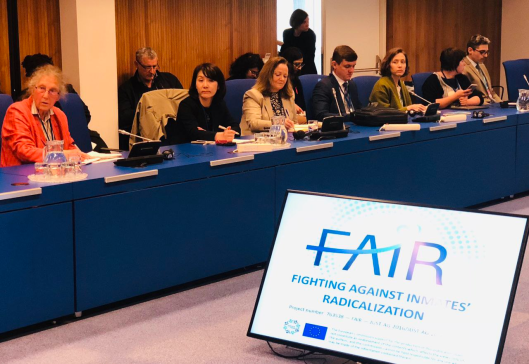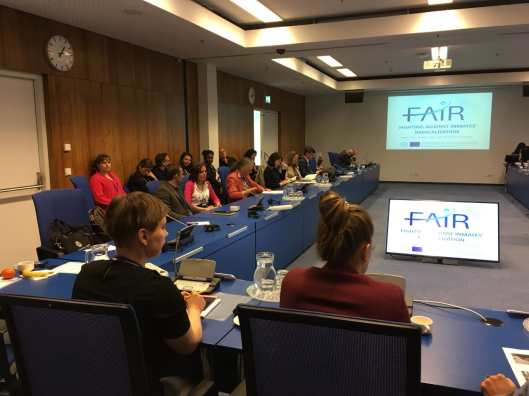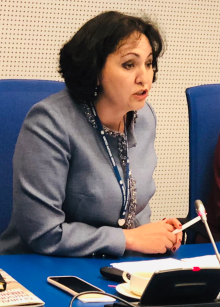PRESS RELEASE: International experts discussed the complexities of prison radicalisation during the 28th Session of the UN Commission on Crime Prevention and Criminal Justice
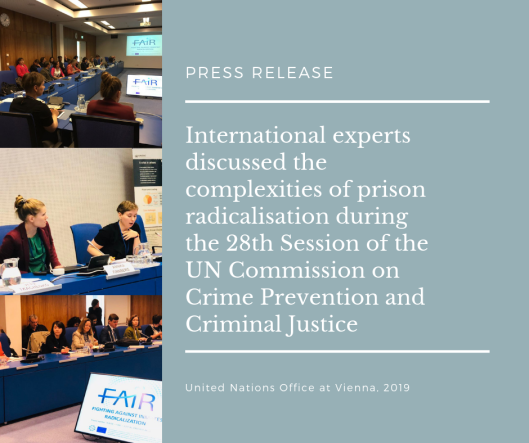
The European Institute for Crime Prevention and Control (HEUNI) together with the Government of Finland and the United Nations Office for Drugs and Crime, Justice Section hosted a side event entitled "Prison Radicalisation: addressing the complexities" in conjunction with the 28th session of the UN Commission on Crime Prevention and Criminal Justice in Vienna.
Ms. Anniina Jokinen, Senior programme officer at the European Institute for Crime Prevention and Control (HEUNI) introduced the audience to the EU-funded project FAIR: Fighting Against Inmates’ Radicalisation which is implemented in nine EU-countries. The complexities in relation to the identification of violent extremism and radicalisation in prisons and lack of awareness among staff as well as lack of standardized approach and disengagement programmes were highlighted as challenges identified within the project. “The prison environment poses a unique set of risks and opportunities in addressing violent extremism", Ms. Jokinen concluded.
Ms. Vera Tkachenko, Crime Prevention and Criminal Justice Officer at UNODC outlined the on-going work of UNODC in this field, including the Handbook on the Management of Violent Extremist Prisoners and the Prevention of Radicalization to Violence in Prisons, published in 2016. Ms. Tkachenko noted that on a global level a connection can be made between growing prison populations, poor prison management and the risk of violent extremism. More targeted research is needed on the scope of the problem as well as the effectiveness of tailored interventions taken.
Ms. Annika Finnberg, Senior Specialist at the Finnish Criminal Sanctions Agency presented the multidimensional approach taken in addressing violent radicalisation and extremism in Finnish prisons and community sanctions. Their model is based on conducting individualised risk assessments and interventions responding to the specific needs and circumstances of individuals whose actions suggest an extremist ideology. "There is a further need to develop rehabilitative models of work to address this issue with the individuals themselves in order to start the disengagement process", Ms Finnberg said.
During the discussion, it was concluded that the response to violent extremism should be embedded into broader prison reform efforts which take into account the United Nations Standard Minimum Rules For The Treatment Of Prisoners (The Nelson Mandela Rules) and ensure proper rehabilitation and reintegration of offenders into society. This requires close cooperation between individuals, authorities and society at large.
For more information, please contact:
Anniina Jokinen, project manager in Finland, anniina.jokinen@om.fi
Aleksandra Anikina, communication officer at HEUNI, aleksandra.anikina@om.fi
–––––––––––––––––––––––––––––––––––––––––––––––––––––––––––––––––––––––––––––––
UNODC is a global leader in the fight against illicit drugs and international crime. Established in 1997 through a merger between the United Nations Drug Control Programme and the Centre for International Crime Prevention, UNODC operates in all regions of the world through an extensive network of field offices. www.unodc.org
HEUNI is the European regional institute in the United Nations Criminal Justice and Crime Prevention programme network. HEUNI functions under the auspices of the Finnish Ministry of Justice as an independent research and policy-making institute. heuni.fi
The Criminal Sanctions Agency is responsible for the enforcement of sentences in Finland. It operates under the direction of the Ministry of Justice and implements the criminal policy defined by the Ministry. The primary duty of the Criminal Sanctions Agency is to see that the sentences passed by the courts of law are enforced lawfully and safely in Finland. In particular, the Agency’s goal is to enhance the safety of society by decreasing sentenced offenders’ risk of reoffending. https://www.rikosseuraamus.fi/en/
EU-funded project FAIR combines 10 partners from 9 European countries. FAIR addresses the problem of radicalisation with a special focus on the prison system. It attempts to: create an internal, prompt warning system, put into practice by the prison operators, that can detect radicalisation symptoms at an early stage, and elaborate an alternative model to traditional detention, one that includes disengagement and rehabilitation programmes for extremist detainees. Project website and online consultation service: http://fair-project.eu/en/
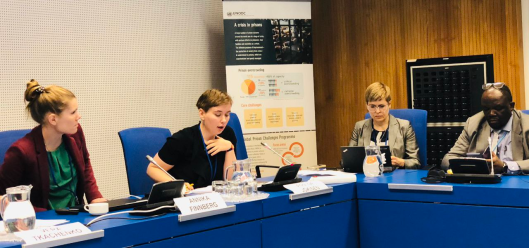 Ms. Anniina Jokinen, Senior programme officer at the European Institute for Crime Prevention and Control (HEUNI) and Ms. Annika Finnberg, Senior Specialist at the Finnish Criminal Sanctions Agency
Ms. Anniina Jokinen, Senior programme officer at the European Institute for Crime Prevention and Control (HEUNI) and Ms. Annika Finnberg, Senior Specialist at the Finnish Criminal Sanctions Agency 